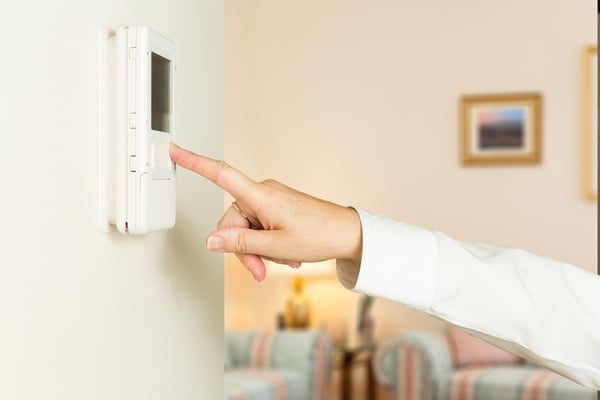Whether you're a regular news junkie or you rely on your better half to keep you updated on the latest, you'll get the same conflicting messages about the state of today's economy. One day you'll hear about rising wages, and the next day you'll read about the lagging growth in the GDP, or Gross Domestic Product.
4 min read
Buying A Home In Today's Economy
By Wasatch Peaks on April 14, 2017
Topics: Home Tips Mortgage Loans
3 min read
Keep Your Wallet Insulated from Winter Heating Costs!
By Wasatch Peaks on January 25, 2017
Q: Winter is here in full force! Every time the furnace kicks on, I feel like it's burning up money! How can I keep my house cozy while keeping the heating costs low?
A: There's nothing better than being toasty warm when it's cold outside. Unfortunately, keeping your home at a comfortable temperature isn't cheap. Heating a house can easily eat $300 out of your monthly budget, depending on where you live and the thermostat setting.
If you're looking for ways to save money, check out these five handy tips for cutting your heating bill this winter.
1. Heat selectively
Part of the challenge of heating a house is heating rooms that no one's in. If you've got a guest room or office that no one uses, all the hot air you pump into it is flowing right back out again. Shutting the doors and closing off the vents in those rooms could save you some green.
On the other hand, if you've got rooms that see regular use, it might be more cost effective to heat them with a space heater. That way, you can keep the thermostat low and still be warm in the rooms you use. This can knock as much as $20 a month off your heating bills!
2. Use the sun
Long before the days of forced air furnaces and radiators, people stayed warm using solar heat. Sunlight streaming through the windows can raise the temperature and make it feel warmer. To do this right, it takes a little bit of timing.
Using thick, insulated curtains helps keep warm air in, but also keeps sunlight out. Open those curtains while you've got exposure, then close them once the angle of the sun has changed. That way, you can trap as much of the free solar heat as you can.
3. Plug holes
Heat gets out through holes in walls. If you actually have holes in your walls, these should be your first priority. But, for most of us, those holes are a little less obvious. Windows and doors are the first culprits. An inexpensive window treatment kit, available at most home improvement stores, can help stop heat loss through windows.
Doors are trickier. If there's a patio door or another entrance that you use less in the winter, consider putting a blanket in front of it to stop drafts. You can also check weather stripping around the doors, as this can deteriorate quickly.
One hole most people don't think much about is the chimney. The only thing between your home and the outside is a sheet of metal, which is a very poor insulator. Installing glass doors, a $200-$300 solution, can save as much as 2% on your energy bill. If you're feeling crafty, a square of foam over the front of the fireplace can accomplish similar results, although it will render the fireplace unusable.
4. Digitize
One of the worst wastes of utility spending is heating a house with no one in it. The same goes for maintaining daytime temperatures when everyone's snuggled up in blankets. Turning the heat up and down all the time can get cumbersome. Fortunately, modern technology has made it much easier.
Programmable digital thermostats will let you warm things up in the morning, ease off at night and avoid running the heater unnecessarily during the day when you're not there. The units themselves are relatively inexpensive, at around $25. Installation can be tricky, but the savings are worth it. The EPA estimates a household can save almost $200 per year with a digital thermostat.
5. Maintenance
Proper airflow is essential to a properly functioning heating system. Anything that blocks the flow of air makes your furnace work harder, costing you money! There are two primary points of blockage: vents and filters.
Cleaning vents can be part of the ordinary process of dusting. It doesn't take any extra time at all to wipe them down with a cloth while you're already cleaning. Replacing the air filter in your furnace is also relatively simple. It only needs to be done every one to three months, depending on your use and air quality.
How do you keep warm when the weather's cold? Ugly sweaters? Imagining a beach? Share your best tips with us in the comments!
SOURCES:
http://www.bankrate.com/finance/smart-spending/10-ways-to-save-money-on-your-utility-bill-11.aspx
http://www.bankrate.com/finance/personal-finance/6-ways-to-save-on-home-heating-6.aspx
Topics: Budgeting Home Tips
3 min read
Going From New Homeowner To Happy Home: Tips For Recent Homebuyers
By Wasatch Peaks on November 7, 2016
Buying your first home is a major milestone. There’s nothing quite like the giddy rush that comes from knowing you could paint a wall fluorescent pink or cover the cabinets in peanut butter and no one could legally stop you. You’ve also got a new and quite big investment you need to maintain. Weighing the freedom against the responsibility is a delicate balancing act, and doing it successfully is part of what being a homeowner is all about.



